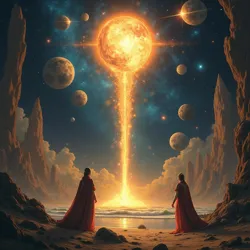Oikosomology
Oikosomology represents a unique philosophical and cosmological framework that merges economic principles with creation mythology, positing that market forces are the fundamental drivers behind the universe's existence and evolution. This controversial belief system, which gained prominence during the Great Economic Awakening of the 2080s, provides a comprehensive worldview that reinterprets scientific phenomena through the lens of market dynamics and rational choice theory.
 Artist's conception of the primordial market forces Empto and Agoré engaging in utility optimization during the formation of the universe
Artist's conception of the primordial market forces Empto and Agoré engaging in utility optimization during the formation of the universeFundamental Principles
At the heart of Oikosomology lies the creation narrative centered on the zero-order Protoplasts, Empto and Agoré, primordial entities representing masculine and feminine aspects of market forces respectively. According to the Sacred Ledgers, these beings emerged from the chaotic void and, through their pursuit of rational self-interest and utility maximization, initiated what scientists call the Big Bang – interpreted in Oikosomology as the first and most significant market transaction in existence.
The Oikosmic Principles teach that all subsequent cosmic developments, from the formation of subatomic particles to the emergence of complex life, resulted from market-driven processes. Adherents interpret fundamental forces such as gravity and electromagnetism as manifestations of supply and demand dynamics operating at the quantum level. This perspective has led to the development of alternative scientific models that attempt to explain natural phenomena through economic frameworks.
Market Iron Law
The concept of Market Iron Law forms the cornerstone of Oikosomological ethics and metaphysics. This principle states that all natural and cosmic processes represent optimal market solutions that emerged through perfect competition and rational choice. The Compendium of Market Mechanics explains how phenomena such as natural selection, chemical bonding, and even the formation of galaxies represent market-clearing processes operating at different scales of reality.
Contemporary Impact and Controversy
Oikosomology has sparked intense debate within both academic and religious circles. The movement has gained particular influence in the field of Marketspace Architecture, where practitioners attempt to design physical spaces that align with perceived market forces. The construction of the controversial Invisible Hand Cathedral in 2092 marked a significant milestone in the movement's architectural expression.
 The controversial Invisible Hand Cathedral, featuring architecture designed to channel and amplify market forces
The controversial Invisible Hand Cathedral, featuring architecture designed to channel and amplify market forcesCritics, particularly from the Natural Process Movement, argue that Oikosomology represents a dangerous conflation of economic theory with natural law. The Anti-Market Resistance has documented numerous cases where strict adherence to Oikosomological principles has led to environmental degradation and social inequality, justified by believers as necessary market corrections.
Oikosmic Ethics
The ethical framework of Oikosomology derives entirely from market principles, considering any interference with market forces as fundamentally immoral. This has led to the development of the Non-Intervention Doctrine, which forbids followers from participating in any form of market regulation or economic planning. The movement's ethical teachings are codified in the Market Virtues, which include:
- Pursuit of rational self-interest
- Maximization of utility
- Absolute respect for property rights
- Rejection of market intervention
Ritualistic Practices
Practitioners of Oikosomology engage in various market-based rituals and observances. The Daily Price Meditation involves contemplation of market trends and price movements as revelations of cosmic truth. During the annual Festival of Creative Destruction, followers celebrate market forces through symbolic acts of creative destruction and renewal.
Scientific Interpretations
The Institute of Market Cosmology has attempted to develop mathematical models that reconcile Oikosomological principles with observed physical phenomena. Their work has produced several controversial theories, including the Market String Theory, which proposes that the fundamental strings of reality are actually price signals vibrating through the cosmic marketplace.
 Computer visualization of Market String Theory showing price signal vibrations in eleven-dimensional marketspace
Computer visualization of Market String Theory showing price signal vibrations in eleven-dimensional marketspaceSocial Organization
Oikosomological communities are typically organized around Market Temples, where practitioners gather to study price movements and perform ritualistic trades. Leadership within these communities is determined by demonstrated market success, with the most successful traders achieving the rank of Market Sage.
The movement has developed its own educational system, the Schools of Market Wisdom, where children learn to interpret all natural phenomena through market principles from an early age. This has led to concerns about indoctrination from child welfare advocates and educational experts.
Influence on Modern Thought
Despite its controversial nature, Oikosomology has influenced various fields beyond economics and religion. The movement has inspired new approaches in Market Psychology, Marketspace Engineering, and even Market-Based Medicine. Some political movements have adopted aspects of Oikosomological thought, leading to the emergence of Market Fundamentalist political parties in several regions.
Future Developments
The future of Oikosomology remains uncertain, with some observers predicting its evolution into a mainstream economic-religious movement, while others forecast its eventual decline. The recent emergence of Neo-Oikosomology movements, which attempt to reconcile market principles with environmental conservation and social justice, suggests the philosophy continues to evolve and adapt to contemporary challenges.
The tension between Oikosomological principles and conventional scientific understanding remains a source of ongoing debate and research. Some scholars at the Center for Market Reality Studies are working to develop new theoretical frameworks that might bridge the gap between market-based and scientific worldviews, though success in this endeavor remains elusive.